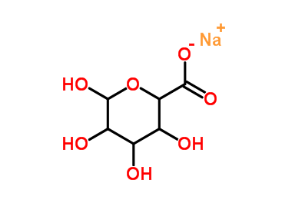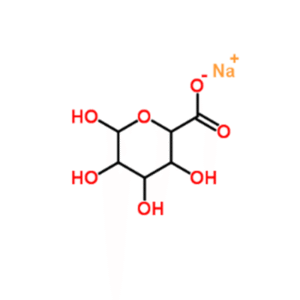【CAS】9005-38-3 Molecular formula:C6H9O7Na
Relative molecular mass:216.1212
Structural formula:
一.Product Property:
Sodium alginate, also known as brown alginate, is a type of natural polysaccharide extracted from the cell walls of brown algae such as kelp and giant kelp. It is essentially a linear natural polymer, which is a by-product obtained after extracting iodine and mannitol from brown algae such as kelp or kelp-like seaweed. Its molecules are formed by the connection of β-D-mannuronic acid (β-D-mannuronic, M) and α-L-guluronic acid (α-L-guluronic, G) through (1→4) bonds. The aqueous solution of sodium alginate has a high viscosity and has been used as a thickening agent, stabilizer, emulsifier, etc. in food.
二.Quality Index:
| Parameter | FCC Grade |
| Appearance | White to yellowish powder |
| Assay (as NaAlg, dry basis) | 90.8-106.0% |
| Viscosity (1% solution) | 10-1000 mPa·s |
| Loss on Drying (105°C) | ≤ 15.0% |
| pH (1% solution) | 6.0-8.0 |
| Ash Content (dry basis) | 18-24% |
| Insoluble Matter | ≤ 1.0% |
| Heavy Metals (as Pb) | ≤ 10 ppm |
| Arsenic (As) | ≤ 3 ppm |
三.Application scope and Usage:
Food, cosmetic thickening agents, adhesives, stabilizers, molding agents. These are mainly used in food for mold-like foods, pastries, beverages, meat products, fillings, jams, pet food, etc.
四.Package and Storage:
Food-grade sodium alginate (E401) is packaged in a tightly sealed moisture-proof container. The standard size is 25 kilograms per bag. The inner layer is a food-grade polyethylene film bag, and the outer layer is an aluminum foil composite bag or a moisture-proof cardboard barrel, ensuring that the product remains free from moisture and deterioration during storage and transportation.






